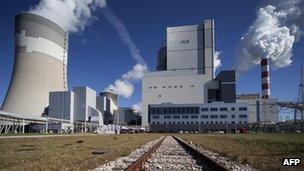EU court rebuffs Poland over CO2 emissions
- Published

Belchatow near Lodz is one of the world's biggest coal-fired power stations
Poland has voiced dismay after the European Court of Justice rejected a legal complaint it made about the EU's mechanism for cutting carbon emissions.
About 90% of Poland's electricity is generated from burning coal, a fuel blamed for increased levels of carbon dioxide (CO2) in the atmosphere.
Poland says the EU's distribution of CO2 emission permits is unfair because it uses gas-based benchmarks.
But the ECJ in Luxembourg said , externalthe EU Commission had not acted unfairly.
"The Commission did not breach the principle of equal treatment when it decided to treat uniformly installations that are in different situations, due to the use of different fuels, when determining the benchmarks," the court ruling said on Thursday.
In a statement to BBC News, Polish environment ministry spokesman Pawel Mikusek said: "The distribution of allowances based on gas-based benchmarks doesn't fit the Polish economy.
"Sometimes in legal terms something looks good, but in real life it doesn't work."
The EU's Emissions Trading System (ETS) created a market in CO2 emission allowances, meaning that heavy emitters of CO2 have to buy allowances from enterprises that have managed to cut their CO2 emissions. The guiding principle is "the polluter pays".
The market is designed to incentivise firms to adopt low-carbon technologies and practices. But the current low price of carbon - about four euros (£3.5; $5.2) per tonne - is far short of the mid-20s target, meaning there is less incentive to sell CO2 allowances.
The Commission plans to withdraw a large portion of CO2 allowances from the market in 2013-2015 in an effort to boost the carbon price.
'Hard lesson'
Unlike many of its debt-laden EU partners, Poland's economy is still thriving, making it reluctant to impose costs on its heavy industry and power installations which could put it at a disadvantage vis-a-vis neighbours with greener economies.
Enterprises fuelled by coal generally need to buy more allowances than those using gas, because their CO2 emissions are higher.
In 2011 the UK accused Poland of blocking an EU effort to set a higher target for cuts in CO2 emissions. The goal was to cut the emissions by 30% - up from 20% - by 2020, from 1990 levels.
Mr Mikusek said the CO2 allowance system, managed by the European Commission, "gives a clear advantage to companies not as heavily based on coal as we are".
It is too early to say if Poland will appeal against the ruling, he added.
"Now we need to sit and read the whole document, analyse it legally," he said, adding that Poland "had to learn this lesson the hard way".
Poland believes EU energy policy should be co-ordinated with global policy, Mr Mikusek said.
"What we do in Europe should be connected. It shouldn't be our part of the world that is doing something different from other parts, if other parts are doing less."
The EU wants China and the US - the world's biggest CO2 polluters - to agree on more ambitious targets to limit climate change. On current trends the world will miss the target of keeping the rise in temperatures below 2C, which experts say increases the risk of drought and rising sea levels.
- Published7 June 2012
- Published23 April 2012
- Published22 June 2011